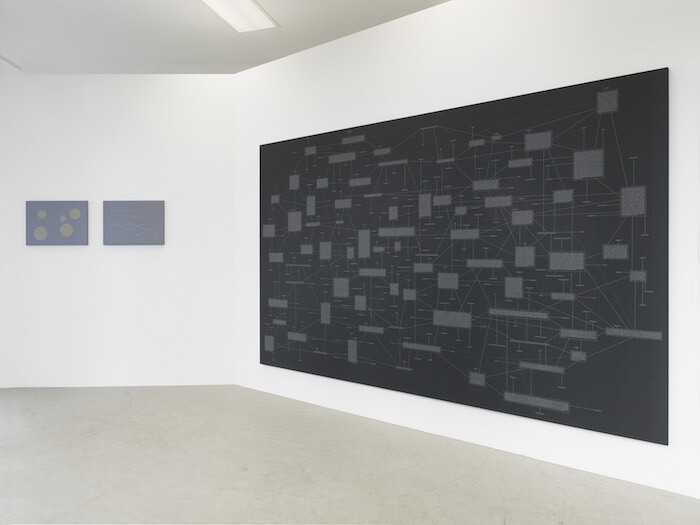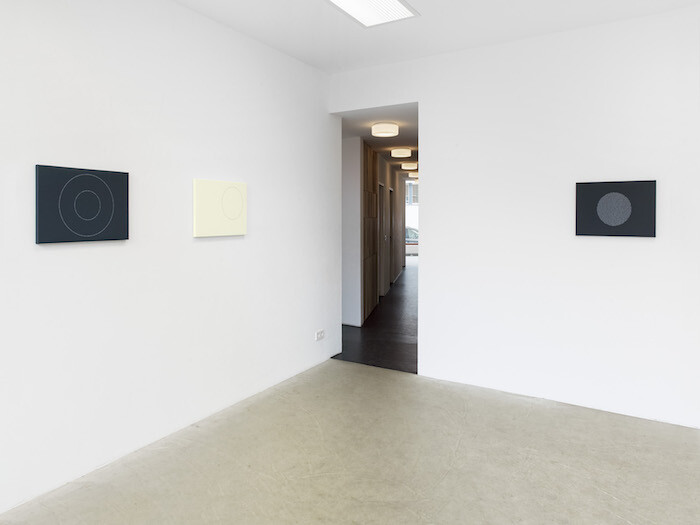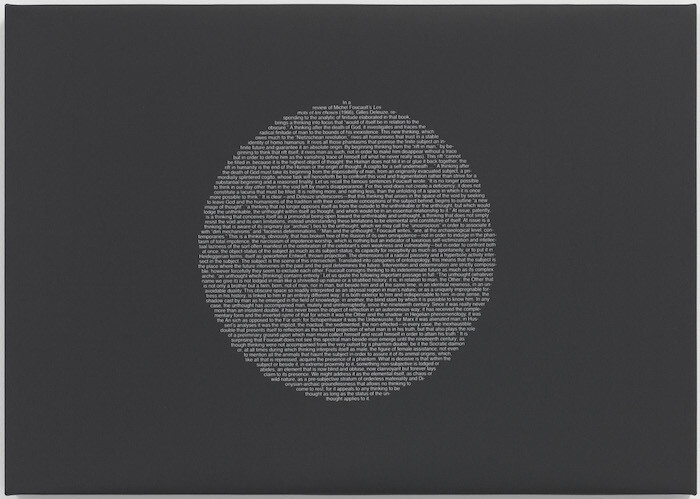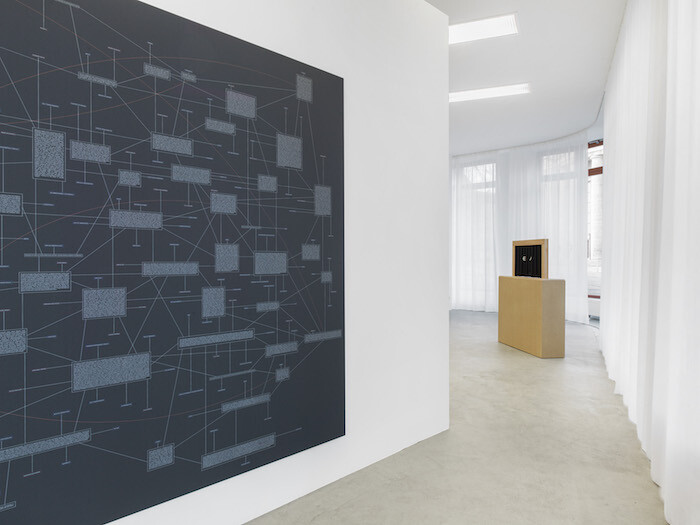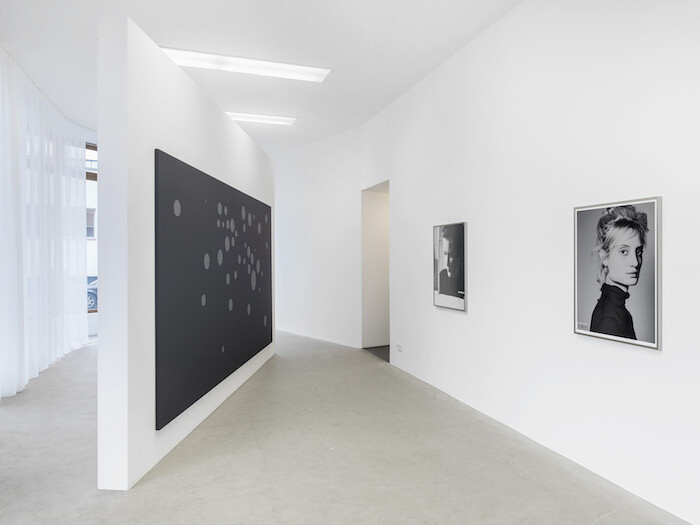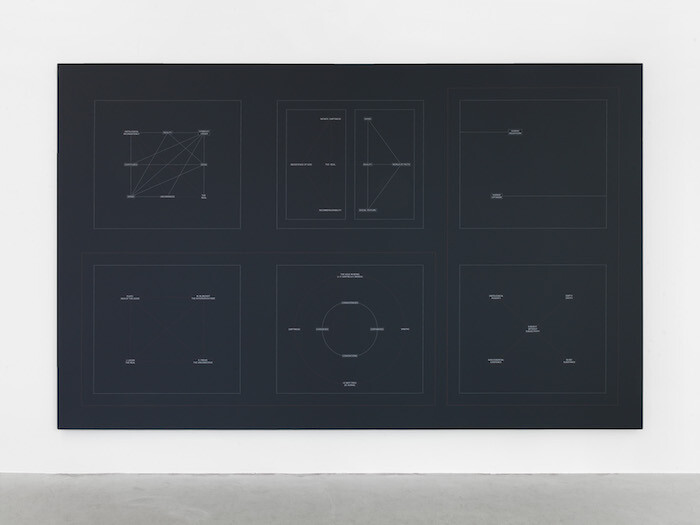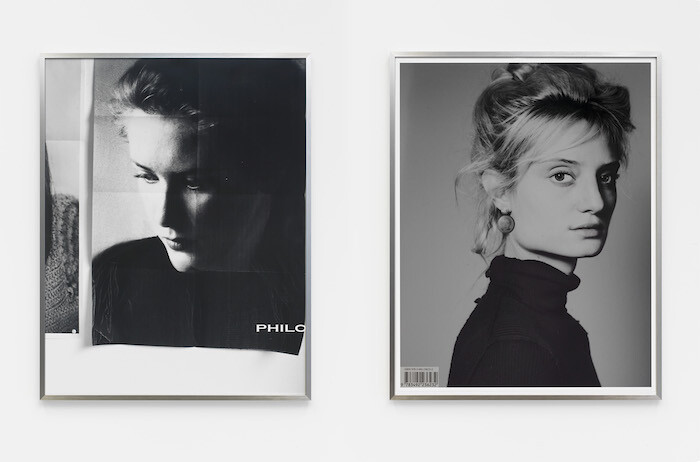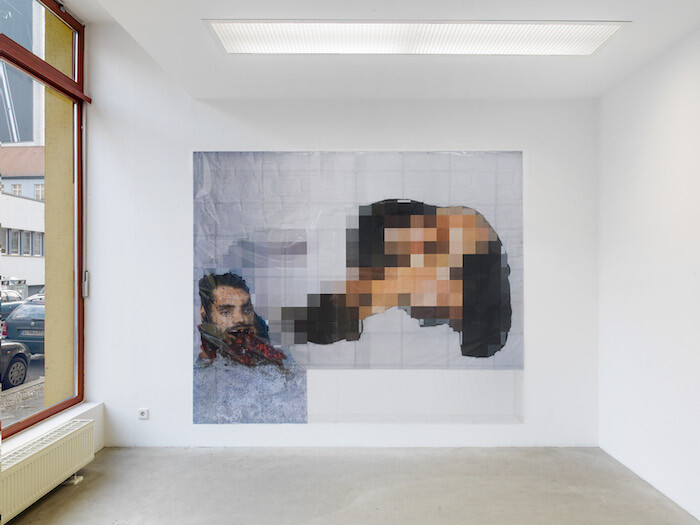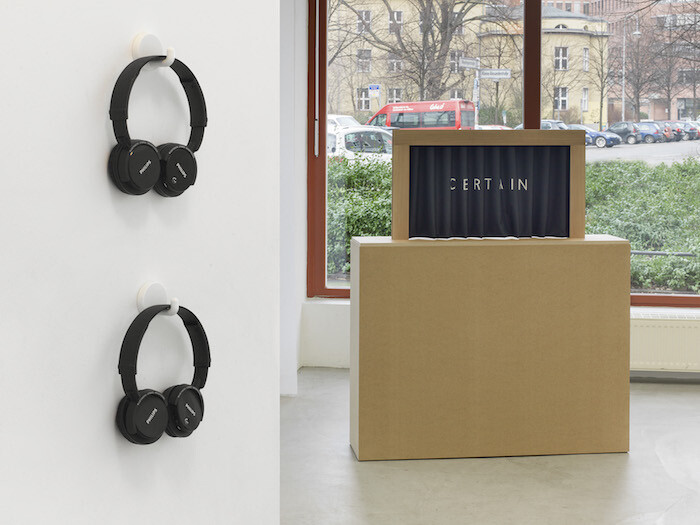Descartes, Deleuze, Lacan, Nancy, Rilke, Weil, Heidegger (!) (just to name a few)—the gang’s all here at Marcus Steinweg’s new show at BQ, whose title, “For the Love of Philosophy,” certainly seems to ring true. “The self is the placeholder and performer of chaos. Descartes already knew this, that is why he wasn’t a Cartesian.” So reads one of the more gnomic assertions on Steinweg’s canvases. These works are positively overflowing with passion for his subject matter, and even if his references aren’t very geographically or culturally diverse, they are at least honestly engaged with, and speak of a deep and abiding commitment to the discipline and practice of philosophy. Steinweg’s canvas-as-parchment approach to the material, however, feels like a somewhat suboptimal marriage of form and content.
Steinweg presents 13 paintings from the series from which the exhibition takes its name. Cleaner and tighter than some of his earlier works on canvas, they feature sleek white digital letters printed on dark backgrounds, or a hide-and-seek of grey and yellow hues. Each presents a section of text, sometimes simply words, other times diagrams, or what might be regarded as a new sub-species of aesthetic literature, concrete philosophy: text arranged into layouts that resemble waves or—at the risk of bringing the obscurities of quantum physics into an already intellectually weighty exhibition—particles. There are hybrids as well, meditations on Hegel that form the familiar interlocking circles of the Venn diagram. In a sense, works like number 12 (the series is not titled but numbered)—come closest to manifesting a genuinely insightful philosophical proposition: the symbolic status of words is sufficiently flexible to encompass a lexical meaning as well as a visual and procedural meaning simultaneously. More overtly schematic works present the names and ideas of thinkers in flowcharts, Euler circles, and enigmatic graphs charting the relative being-to-nothingness ratio of different philosophers (fun “fact”: Badiou is both more being-y and nothing-y than Sartre!). Some might dare utter the word “pretension,” but it is rather enjoyable to follow all the connections—real and tenuous—that these expansive mind maps trace. Also, the very oddness of a being-to-nothingness graph, expressing the deepest philosophical questions with the tools of quarterly earnings reports, is, in itself, an articulation of a wry deflationary truth.
The question remains, however, of the value of simply digitally printing text on a canvas in the year 2017. More than four decades after the first major wave of lexically concerned contemporary art, I found it very difficult to accept that the canvases truly transcended a kind of design-age form of decoration. In one sense, they are too much a concession to physicality to truly represent “thought for thought’s sake,” but also their linguistic content is too cursory to truly manifest argument rather than mere apothegm. Taken as a whole in the gallery environment, there is a legitimacy to the heavy reliance on text. At the opening, viewers positioned themselves within squinting distance of the words, eschewing the larger picture for a small detail. The art of critical positioning is frequently defined by a partial reading of a work; here the process was literalized in three dimensions. Score one for methodology of display, but removed from the gallery, as one anticipates artworks might be, the same works run the risk of deliquescing into lifestyle accessories instantaneously. There’s a larger point to be made, however, about the ways in which philosophy is subordinated to a system of commerce and branding, but a less polite set of works would have been required in order to make it sting. Though Steinweg clearly is engaging the notion of philosophy as commodity with these canvases, unlike, for example, Andy Warhol’s Brillo boxes, the mix of criticality and collusion is a bit too overt to express the same sense of intensity and necessity. They touch a sensitive spot in contemporary Western art culture, but, ultimately, they only graze it.
Though Steinweg makes up the majority of the show, there are other works on view by his frequent collaborators and aesthetic interlocutors, including Rosemarie Trockel, Thomas Hirschhorn, Marcellvs L., and Bethan Huws. Trockel and Hirschhorn come off particularly well in the configuration of “For the Love of Philosophy,” with the magazine visages of Trockel’s Freudian Slip (2017) and Homesick (2017) gazing impassively at the deep-thought bubbles of number 1 in Steinweg’s series. In Hirschhorn’s NSFW Pixel-Collage No. 77 (2016), positioned just across from the aforementioned being-to-nothingness graph and other high-minded works, a severed head in the lower left-hand corner serves as a reminder that reason is nodding off to sleep as this new(ish) century matures, and that, for all the profound meditations on the nature of being, we also contain a terrifying counter-rational impulse that is increasingly proximal to the surface.
